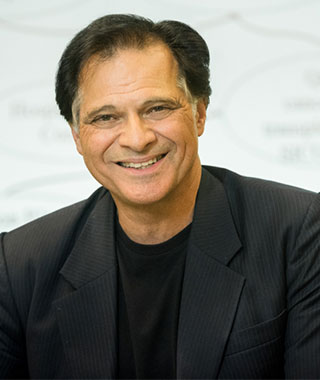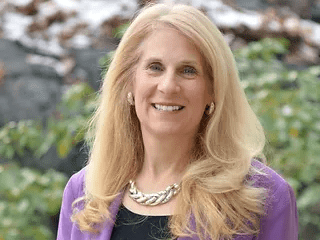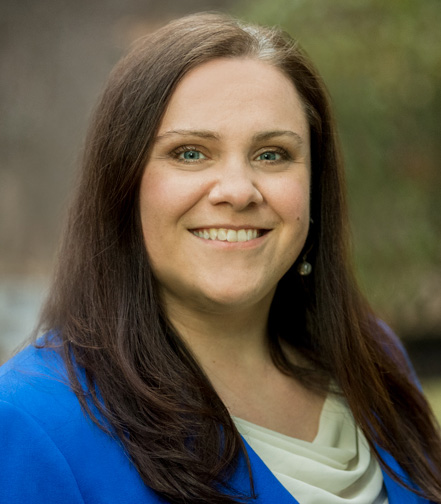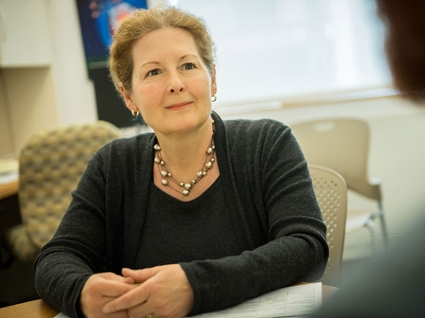By Sarah C. Baldwin
Heena Santry, MD, MS, MPH, EMBA’25, always wanted to be a change agent. As a practicing acute care surgeon, health services researcher, and healthcare strategist for an architecture and design firm, she spent 20 years seeking new ways to improve healthcare delivery in this country.
With great frustration, she found that potential change often met with resistance. When she proposed research to test a healthcare delivery innovation, for example, she sometimes encountered funders who were more interested in trials that might lead to cures for disease. When she proposed novel ways of organizing clinical teams to improve post-operative outcomes, she was confronted with hospital administrators who didn’t understand the real-world challenges her patients were facing.
Santry began to ponder her next steps. “[If I became] surgery department chair, I knew I could influence surgical care delivery for the clinical specialties I oversaw. As a researcher, I could maybe shape emergency general surgery,” she says. “But I felt that the scope of my impact would be too limited if I stuck with academic leadership and health system redesign research.”
So she decided to add one more credential to her long list of degrees: a master’s degree in business administration (MBA). “I’d sat across the table from far too many people who had those three letters and no clinical background at all,” she says. “They were coming up with solutions that were out of touch with [clinical] reality.”

After exploring several top executive MBA programs, including those offered by MIT and the University of Pennsylvania, she decided to pursue the Heller School’s Executive MBA for Physicians (EMBA). One of very few programs designed exclusively for physicians, the EMBA is the brainchild of Jon Chilingerian, a professor of management at Heller from 1987 until 2023, and a widely esteemed expert in management and leadership. (Read more about him here.)
Chilingerian was acutely aware of the confounding paradox in America’s healthcare system: The United States spends more on healthcare but achieves worse outcomes than any other high-income country. One way to begin to correct that discrepancy, he believed, was to bring medicine and management together — that is, to bridge the gap between how health systems are managed and how clinical care is delivered. The key, he thought, was not to give administrators clinical training, but to train clinicians to be effective managers.
Drawing on his decades-long experience designing executive education and management programs (including Heller’s MD/MBA program with Tufts School of Medicine and Heller’s Social Impact MBA), Chilingerian worked for years to design a curriculum that would accommodate the busy lives of mid-career practicing medical professionals, and enlisted many of Heller’s renowned health policy and management experts to help teach it.
A Seat at the Table
Launched in January 2016, the EMBA is a 16-month accelerated hybrid program consisting of four semesters, each of which includes a 10-day residency. Through this combination of online and in-person learning, physicians master core MBA topics such as operations management, leadership, organizational behavior, and financial reporting. Integrated into the curriculum are medicine-specific subjects, such as healthcare artificial intelligence, management of healthcare organizations, national and state health policy, and healthcare entrepreneurship.

EMBA Director Brenda Anderson, a former director of the Heller MBA, teaches Healthcare Financial Reporting and Analysis and Managerial Accounting. She’s imparting skills she says will help physicians understand whether they can afford to buy new robotic equipment for the operating room, for example, or how to determine the real cost of rolling out a new service line.
The idea, according to Anderson, is to give doctors “a seat at the table” so they will be included in high-level decision-making at their healthcare organizations. This appealed to Santry, who points out that most physicians lack a robust accounting and finance skillset, something they neither learn in medical school nor “pick up on the fly.”
“With the CFO or other people who are responsible for the books, you can have far more educated discussions on where to make capital investments or whether to post new positions,” she says. “When you go to the table asking for that funding, if you understand where the numbers are coming from and what it means to invest those funds, it allows you to be far more effective at advocating for what you need.”

Applied learning is a key component of the EMBA. According to Senior Associate Director Amy DiMattia, “One of the greatest parts of the program is that these physicians are coming into class learning concepts, processing what they mean for their respective worlds, going to work the next day and putting them into practice, and then coming back to class a week later and saying, “‘Here’s what I tried. Did it work for you?’”
In addition to lectures, webinars, and simulations, the 30-some physician-leaders-in-training engage in the Executive Team Consulting Project, during which they identify a management challenge in their current organization and lead a team of employees to implement a solutions-based initiative. Eighteen case studies that came out of the course were published as a collection in “The New Science of Medicine & Management” (Springer Nature, 2023), co-edited by Chilingerian.
“We’re helping physicians learn how to build optimal teams, understand team dynamics, and get a team to work effectively to solve healthcare problems in real time,” explains Anderson. “We’re giving them conflict resolution and negotiation skills. We’re teaching them how to integrate information about organizational structures, power, influence, operations, and systems thinking in strategically navigating challenges to identify optimal solutions.”
Even though her classmates’ backgrounds and specialties vary, Santry (who has maintained some level of clinical practice throughout her career, including during the EMBA) appreciates that as medical professionals, they have much in common.
“There’s always something to be gained through the lens and expertise of people in other professions. But when it comes to creating effective solutions for healthcare delivery, many of the big business solutions aren’t going to work,” she says. “In any other industry, if you fail, you lose money. In our industry, if we fail, people lose their lives or their limbs or their livelihood.”
Being with like-minded physicians who bring insights, knowledge, and expertise from healthcare “elevates and accelerates the learning,” she adds.
A Different Kind of Bottom Line
DiMattia points out that unlike in many MBA programs, Chilingerian’s goal in creating the EMBA was not to position MDs to earn more money, but to improve a major industry from the inside. “Jon’s attitude was that an industry that literally impacts every single one of us is in trouble, and [we] have an opportunity to have a huge positive impact on the future leadership of that industry,” she says. “He had an unwavering commitment and passion to making that difference.”

Carole Carlson, an expert on social entrepreneurship who teaches Healthcare Strategy and Healthcare Entrepreneurship, says, “When you consider that in 2022, healthcare was over 17 percent of the country’s gross domestic product and spending was over $13,000 per person, you realize it’s a very, very big piece of our economy. If you’re thinking about business and social good, you have to be thinking about healthcare as one of the major categories.”
Anderson agrees: “What we need is some type of impactful transformative change in healthcare. We try to attract individuals who are dedicated to that mission, who want to have a sustainable, positive impact on healthcare.”
This perspective resonates with Santry. Having based her entire career on “providing the opportunity for good health to many instead of a few,” she values Heller’s longstanding strengths in social policy. She says that Heller is good at what other business administration programs also do well, “but centering financial analysis, fiscal decision making, and leadership on a core ethos that ‘there is a human being at the center of what you are doing, not a dollar sign’ — that is palpable in the Heller program,” she says, adding, “Being centered on the human being at the root of it all is just a brilliant way to teach people who chose to be physicians.”
Anderson notes that “the EMBA is intended to empower physicians with management and leadership skills so they can be not only expert clinical diagnosticians but also expert management diagnosticians.” While the program is working toward improving quality and efficiency in healthcare, she is quick to underscore that the ultimate goal is about patients. “We have our eye on the ball, she says, “and that is to always focus on improving patient outcomes and experiences.”
This sensibility, shared by EMBA participants, makes for a tight-knit cohort, says Santry, who describes the in-person residencies as more like “family building” than team building: “We care about each other so much, and we are invested in each other’s success.”
Improving the Healthcare System, a Few Dozen Doctors at a Time
“We’re trying to plant seeds with these physicians, hoping their growth trajectory post-graduation impacts healthcare in a transformative way,” Anderson says. The trajectories of the approximately 250 EMBA alumni — many of whom now have “chief,” “director,” “vice president,” or “president” in their professional titles — attest to the program’s success. Many are working in leadership roles in hospitals, multi-specialty practices, large health systems, and community clinics.
“On our ninth class now, we have educated hundreds of physicians who are working in influential positions in a large number of healthcare systems creating positive change,” adds Carlson.
She recalls a recent graduate who worked for a large for-profit health system when he entered the EMBA, developed a personal motto of “doing the most good for the most people in the shortest amount of time,” and pivoted to become the CEO of Burjeel Medical City, the most comprehensive private quaternary care hospital in Abu Dhabi. Another, Jill M. Baren, EMBA’19, became president of Lake Forest College, a private liberal arts school 30 miles north of Chicago, in 2022.

Santry, still a clinical associate professor of Surgery at Wright State University, in Dayton, OH, was not yet an alumna when she landed her current position. During the first half of the EMBA, she went through several rounds of interviews at Arcadis, a large global company delivering sustainable design, engineering, and digital solutions for the natural and built environment. An assignment for Carlson’s Healthcare Strategy class was to identify a strategic challenge in one’s current organization and use two or more tools taught in the course to create a strategy document. For her paper, Santry wrote about Arcadis’ healthcare practice, and then shared it with the company “to demonstrate how I would think about the group strategy if they were to hire me as healthcare principal.” Which they did.
According to DiMattia, Chilingerian’s passing, while devastating, did nothing to diminish her or her colleagues’ belief in the power of the program. “Our attitude was, we’re going to keep doing it because we’re making a difference,” she says. “Healthcare needs us to do this, so we will push forward.”
